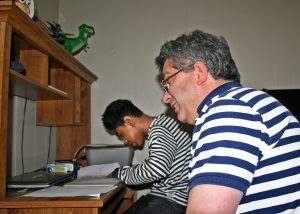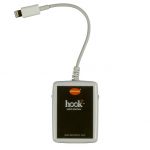
Because of the COVID-19 pandemic, teaching and learning is being done remotely. For students with disabilities, we all have an obligation that all online material is fully accessible.
COVID-19, School Closures, and AT: What Do We Do?
The Richard West Asssistive Technology Advocacy Center (ATAC), Trenton, NJ. Mike Marotta, Director, has been has been working with colleagues to come up with and disseminate helpful ideas on assistive technology during school closures. Mike is hosting “AT Town Halls.” Knowledgeable professionals are encouraged to participate! The first such event was on Monday, March 16, 12:00 to 1:00 p.m. In case you missed it, he archived the collaborative conversation on the ATAC YouTube channel. To help out, we have summarize it here.
“During these uncertain times, many schools are moving to remote instruction. What does that mean for students with disabilities? How do we ensure that remote instruction is accessible to all students? How can we continue to meet the needs of students who require assistive technology? What do we do about providing related services (OT, PT, SLP) to these students? This is an ever evolving situation and we certainly don’t have all the answers but let’s come together and brainstorm effective solutions.”
ATAC has planned another four AT Town Halls; dates and links to register are as follows:
- Monday, March 23, 2020, 12:00–1:00 p.m. Eastern Time
- Monday, March 30, 2020, 12:00–1:00 p.m. Eastern Time
- Monday, April 6, 2020, 12:00–1:00 p.m. Eastern Time
- Monday, April 13, 2020 12:00–1:00 p.m. Eastern Time
Facilitator:
Mike Marotta, Director, The Richard West Assistive Technology Advocacy Center, NJ
Panel Members:
Chris Bugaj, Assistive Technology Specialist, Loudoun County (VA) Public Schools
Kelli Suding, AT Specialist, PATINS
Jennifer Edge-Savage, AT Consultant, Saltillo, Professor
Karen Janowski, AT Consultant, EdTech Solutions
Luis Perez, Technical Assistance Specialist, CAST
Meanwhile, check out (and add to!) the crowd-sourced Google Document with ideas or strategies and questions regarding supporting students with disabilities in these challenging times.
Now, here’s the summary!

Daniel Berek, Family Support Specialist, helps Xavier T. with his homework during in-home respite services.
According to the Office of Special Education Programs (OSEP), which is part of the U.S. Department of Education, a school that provides educational services to students during a school closure must “ensure that students with disabilities also have equal access to the same opportunities.” The panel agrees that when a school sends home a packet or assigns material via Google Classroom, they are providing educational services.” However, they register concern about the varying levels of technological knowledge among educators and, even more important, digital equity (even access to the internet). So, what steps can we take to ensure remote instruction is accessible to all students? Do the students have the personal support at home to manage the technology? (Even if parents or guardians are at home, they may both have to work.)
Remote Instruction
Some children will be bringing home paper packets. But for many students with dyslexia or who are blind or visually impaired, paper does not work. How can we make those packets accessible to these students? For those students who have an assistant at school to help them access this content, neither they nor their parents will be able to get this system to work at home. The panel called on assistive technology professionals in schools and the community to make themselves available to help such students navigate their technology remotely.
If a child is going to watch YouTube videos, this is best done with a parent or guardian. That person should pause the video to engage the child to talk about what is happening. Furthermore, captioning that is turned on exposes the child to text.
Mike and a viewer remind that reading works aloud and posting them for the general public are a copyright infringement. Making a recording of a book is permissible only if it is made solely for a particular student and only they have access to it.
Accessible Materials
The U.S. DOE Office of Civil Rights (OCR) just released a short webinar on online education and website accessibility.
Many well-meaning people are trying to do their part by sharing links to websites and tools that can help students at home. However, there is a basic test to ensure we are not passing along tools that are not accessible. The first is the “no-mouse challenge.” Flip over the mouse and tab through to see if you know where you are. “If you cannot tell where you are, then AT probably will not be able to tell where it is, either,” says Luis Perez, Technical Assistance Specialist, CAST. PDF does not work well on mobile devices, he adds.
Chris Bugaj, Assistive Technology Specialist, Loudoun County (VA) Public Schools, mentions Grackle Docs. This is a G-Suite add-on that checks the accessibility of files created in Google Classroom and then instructs, step by step, what to fix.
According to the AT3 Center blog, if a worksheet was created as a digital file, it should be provided it as a digital file, too. “Assistive technology can access digital files more readily, and often with built-in features of computers and mobile devices,” says Eliza Anderson, editor of the organization’s blog.
Mike Marotta reminds us that all devices have some form of accessibility features; they are free and should not be overlooked.
Access to Assistive Technology
Although most child are able to take their AAC device home, what happens if it breaks down? Chris Bugaj recommends always having a low-tech or light-tech alternative on hand as a back-up. Also at issue are those children and families who do not have access to the internet.
Supporting Other Educators
To keep this topic on a positive note, “We’re not focusing on what’s happening and the resolutions…. We have packets. How can we transform that into a way that’s accessible and opening those conversations.” Says Kelly. “We have to figure out ways to go forward. We cannot just be stuck on the things that have not happened.” The challenge she and proposes is to find ways in which we can we make AT for students better and make it a learning opportunity.
Here is the archive of the first video:

